Former Uber Self-driving Head Declares Bankruptcy

The former leader of Uber Technologies’ self-driving unit, Anthony Levandowski, filed for Chapter 11 bankruptcy on Wednesday, and it looks to have something to do with the $179 million he’s legally obliged to pay Google. A San Francisco County court decreed the same day that Anthony needs to pay out in order to settle his contract dispute.
In December, it was ruled that Levandowski and Lior Ron violated their agreement with Google when they left the company to start Otto — a rival autonomous vehicle company focused primarily on commercial trucking. Uber purchased Otto in 2017 but Google’s self-driving arm (which evolved into Waymo) claimed Levandowski violated intellectual property laws by stealing trade secrets it owned for Uber. While Ron decided to pay $9.7 million to settle with the tech firm, Anthony held out. He also faces a federal indictment over the alleged intellectual property violation.
According to Reuters, Mr. Levandowski is estimated to have between $50 million to $100 million in assets, compared with $100 million to $500 million in liabilities. The Chapter 11 filing should give him some amount of protection. He also might not be legally liable for entire sum. Uber may also be forced to help out, depending on what his contract says.
Regardless, the saga seems to have worked out rather well for Google/Waymo. Uber settled way back in 2018, offering 0.34 percent of its equity while agreeing never to use Waymo’s confidential information in its autonomous vehicle technology — though some of the items originally deemed “trade secrets” were dropped. It was an odd situation, as Google’s legal team initially seemed to have serious problems proving that Uber had done wrong and the case was stymied by both parties not wanting any technological details leaked to the public. The settlement came as a big surprise, though it was likely preferable to the complications that would arise from a prolonged legal battle.
[Image: Uber]

A staunch consumer advocate tracking industry trends and regulation. Before joining TTAC, Matt spent a decade working for marketing and research firms based in NYC. Clients included several of the world’s largest automakers, global tire brands, and aftermarket part suppliers. Dissatisfied with the corporate world and resentful of having to wear suits everyday, he pivoted to writing about cars. Since then, that man has become an ardent supporter of the right-to-repair movement, been interviewed on the auto industry by national radio broadcasts, driven more rental cars than anyone ever should, participated in amateur rallying events, and received the requisite minimum training as sanctioned by the SCCA. Handy with a wrench, Matt grew up surrounded by Detroit auto workers and managed to get a pizza delivery job before he was legally eligible. He later found himself driving box trucks through Manhattan, guaranteeing future sympathy for actual truckers. He continues to conduct research pertaining to the automotive sector as an independent contractor and has since moved back to his native Michigan, closer to where the cars are born. A contrarian, Matt claims to prefer understeer — stating that front and all-wheel drive vehicles cater best to his driving style.
More by Matt Posky
Latest Car Reviews
Read moreLatest Product Reviews
Read moreRecent Comments
- ToolGuy The only way this makes sense to me (still looking) is if it is tied to the realization that they have a capital issue (cash crunch) which is getting in the way of their plans.
- Jeff I do think this is a good thing. Teaching salespeople how to interact with the customer and teaching them some of the features and technical stuff of the vehicles is important.
- MKizzy If Tesla stops maintaining and expanding the Superchargers at current levels, imagine the chaos as more EV owners with high expectations visit crowded and no longer reliable Superchargers.It feels like at this point, Musk is nearly bored enough with Tesla and EVs in general to literally take his ball and going home.
- Incog99 I bought a brand new 4 on the floor 240SX coupe in 1989 in pearl green. I drove it almost 200k miles, put in a killer sound system and never wish I sold it. I graduated to an Infiniti Q45 next and that tank was amazing.
- CanadaCraig As an aside... you are so incredibly vulnerable as you're sitting there WAITING for you EV to charge. It freaks me out.


































Comments
Join the conversation
Hi, aside from the bias ttac has regarding car sharing progams how does a person's personal bankruptcy have anything to do with the truth about cars. I did enjoy the ace of base on the ford e-350 cutaway. I wish they still made the van. Thanks!
Deleted